Students support classmates, neighbors with mutual aid


Several Pitt students have launched Pitt Mutual Aid, a resource for students and community members who face various forms of insecurity from stipulations of the coronavirus outbreak.
When Rasul Adams found out the University was asking him to leave his single room in Lothrop Hall, he wasn’t comfortable going back to his home in the Caribbean, for many reasons.
“I was very wary of going to any airport or riding an airplane right now, because people can be sick with it without even knowing,” Adams said.
Even though Pitt said students could stay in on-campus housing if they provided an explanation, Adams, a senior psychology major, was nervous about dealing with the changing circumstances of the coronavirus outbreak while living alone in a small room, unable to talk to other people face-to-face because of social distancing.
“In case I got sick, I wouldn’t feel that safe there,” Adams said.
Knowing many of their classmates are facing similar situations, Pitt students have launched Pitt Mutual Aid, a resource for students and community members who face various forms of insecurity from stipulations of the coronavirus outbreak. The resource has allowed students to find things like temporary housing by connecting residents in need to people who can support them.
The information and communication have taken the form of a Google spreadsheet, a Discord channel and an Instagram page.
Neerja Garikipati, a junior molecular biology major and Mutual Aid organizer, said when she heard about campus closures, she was nervous about some of her friends who wouldn’t be able to return home if Pitt closed because of the coronavirus outbreak.
“I have a lot of friends who are either first-gen, low income or can’t go home or don’t want to go home for whatever reason,” Garikipati said. “As the situation kept escalating, I was like, it’s only a matter of time before we have something similar happen.”
Garikipati said she was inspired by mutual aid organizers at other schools like Harvard and Yale. She started communicating with other members of AQUARIUS, a student group on campus supporting Asian American members of the LGBTQ+ community, about setting up a similar project at Pitt.
She then reached out to the Asian Student Alliance and connected with Albert Tanjaya, the vice president of external affairs for ASA. Tanjaya, a senior computer science major, said he realized some students would be affected by campus closures more than others — particularly marginalized communities.
“It was from a call to action for poor students, low income, first generation would be affected,” Tanjaya said. “People part of the LGBTQ+ community would be affected. People who are marginalized, people of color, blacks, Asians, Hispanics, Latinx, anyone on campus who might be suffering from the consequences from being displaced might be affected.”
Garikipati said the same, and added that these students face certain circumstances that make them uncomfortable with going home, such as parents who are unsupportive or homophobic.
Tanjaya, who’s in charge of the housing, storage and transportation connections for Mutual Aid, said he’s proud of the way the Pitt community came together to support people in difficult circumstances.
“To know that these students have a place to stay and that their hosts are also students who are open to housing them, that sense of community makes me feel like everything that we’re doing is validated and everything that we’re doing matters,” Tanjaya said.
So far, he’s connected two people, including Adams, to temporary housing. Adams said he moved into an off-campus apartment yesterday, with the help of students who provided their cars to help move his things — another connection through Mutual Aid.
He said he plans to stay at this location for the next six weeks and then will try to find other off-campus housing.
“Everybody’s very understanding of the situation. I’m very grateful for them to let me into their home,” Adams said.
For his food, Adams said he relied on his campus meal plan, but has since been utilizing the Pitt Pantry.
Tanjaya said Mutual Aid is working on a grocery delivery service for those who are unable to get food for themselves. He said it would be a no-contact dropoff, and would come from the 10 or so students who offered their cars to Mutual Aid. Tanjaya said he’s also working on a website to bring all of the resources to one place and to reach students beyond just social media.
Mutual Aid has also been able to provide monetary relief for students. Garikipati said community members have donated to the group, providing funds to help those facing financial insecurity during this time. Those in the Pittsburgh area can request aid or make a donation through a Google form. Garikipati said the group has raised more than $1,000 in donations.
If the crisis resolves sooner than expected, Garikipati said Mutual Aid has outlined a plan for what to do with possible remaining donations.
“We’re going to donate it either to a charity or hold the funds to make it a long term infrastructure situation, because who knows what’s going to happen, if this is a recurring seasonal virus or if it’s going to be a one-off thing,” Garikipati said.
For all of the work it’s doing, Garikipati said students involved in Mutual Aid and its leadership team are adhering to social distancing guidelines from the Centers for Disease Control and Prevention and encourage others to do the same. All of the executive board meetings for Mutual Aid have taken place through FaceTime, Skype or Google Hangouts, she said.
“I get it sucks, but hopefully this will end eventually and we can go back to our normal lives,” Garikipati said. “For the time being, listen to the CDC.”
In addition to expanding the range of services it offers, Tanjaya said Mutual Aid is designed to help those in the community beyond just Pitt students.
“We figured that low-income, first generation, marginalized groups aren’t exclusively students. Those are also community members. If we can help people who aren’t just students, we want to, because we’re all in this together,” Tanjaya said.
He said students from Carnegie Mellon University have offered resources like housing space or a ride in their cars, and local residents from neighborhoods like Squirrel Hill and Plum Borough have as well.
In addition to Mutual Aid being completely student-run, Tanjaya said there’s another aspect to the group that highlights the dedication of its members.
“This whole thing is all volunteers,” Tanjaya said. “It’s not like it’s a job. It’s about the passion you have for the community and the greater sense of everything.”
Recent Posts
Marquan Pope: The ultimate shark
One of the most remarkable things about sharks is that an injury doesn’t deter them.…
Who Asked? // Do we really get a summer vacation?
This installment of Who Asked? by staff writer Brynn Murawski mourns the seemingly impossible perfect…
Notes From an Average Girl // Notes from my junior year
In this edition of Notes From an Average Girl, senior staff writer Madeline Milchman reflects…
Meaning at the Movies // The Power of the Movie Theater
In this edition of “Meaning at the Movies,” staff writer Lauren Deaton discusses her love…
EMBRACE sponsors Black Maternal Health Wellness week
Because Black women’s maternal health is not institutionally prioritized, Pitt’s EMBRACE sponsored a Black Maternal…
Local ‘Standing Wave’ coffee truck energizes the Pitt food scene
The small business coffee truck “Standing Wave” has become a beloved new coffee spot on…

